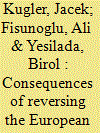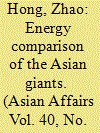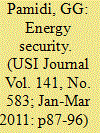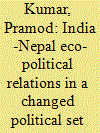| Srl | Item |
| 1 |
ID:
137819


|
|
|
|
|
| Summary/Abstract |
Today, financial crisis once again threatens the unity among member states and future of the European Union. The magnitude of the problem is so grave that observers and analysts have concluded a big decision must be made regarding fiscal union (thus political union) to save EMU. “Is this really the end of the road for Eurozone?” Using Power Transition theory, our analysis shows that trust and relative political capabilities are essential to build a stable Union. While it is clear that the center of global politics is shifting away from Europe and the United States to the Asian giants—the transition from West to East can be effectively planned so that the future units are satisfied with each other rather than distrustful, dissatisfied, and contentious. The slowdown of integration is not simply a regional problem with serious consequences for the economic stability of Europe. Far more importantly, our analysis suggests that the process of integration that has reduced tensions within a region previously characterized by major wars may be declining and that this in and of itself could reset the stage not only for regional confrontations but increase the likelihood that global wars may once more be considered as means to solve disputes. The European Union cannot afford to move from the cooperative contest to a confrontational one where solutions are arrived at by force rather than reason. Therefore, the challenge for European leaders is to resolve the current crisis in the EMU and build upon it a reinvigorated union that once more provides a path for complete regional integration.
|
|
|
|
|
|
|
|
|
|
|
|
|
|
|
|
| 2 |
ID:
103147


|
|
|
|
|
| Publication |
2009.
|
| Summary/Abstract |
This article seeks to evaluate the impact of India and China on world energy markets by setting their future energy demands, principally for coal and oil, in the context of their domestic supply potential. After examining their approach to energy efficiency, the author concentrates on their energy diplomacy and the way in which they have sought to enhance their security of supply by targeting exporting countries, often those with a somewhat fraught relationship with the west. He concludes that it is in their interest to further strengthen their co-operation and avoid competition which simply drives up the price they pay for oil.
|
|
|
|
|
|
|
|
|
|
|
|
|
|
|
|
| 3 |
ID:
106214


|
|
|
| 4 |
ID:
133904


|
|
|
|
|
| Publication |
2014.
|
| Summary/Abstract |
A small country in the Himalayan kingdom, Nepal carries vital importance for India as far as its security is concerned, as India's biggest rival, China, is just north of Nepal. Hence Nepal is sandwich between the two Asian giants, India and China and that is its worry and at the same time its advantage too as it exploits this very facts and bargain well with both these countries very efficiently. Nepal is a land locked country and it has to depend on India for its transit routes which give India an upper hand in tackling the problems arising out of Nepal's attitude.
|
|
|
|
|
|
|
|
|
|
|
|
|
|
|
|